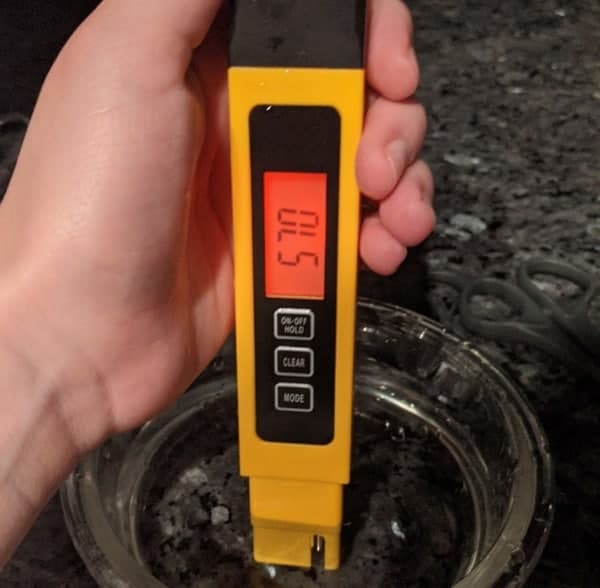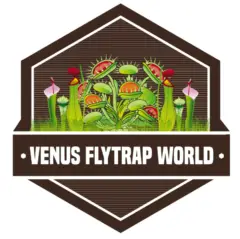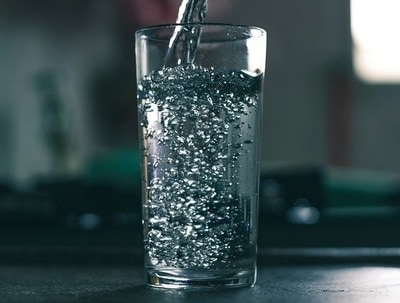Watering Venus flytraps with the correct water source is an essential task to keep them healthy. Filtered water is safe for humans, but is it safe for Venus flytraps?
Filtered water with a Total Dissolved Solids measurement of less than 50ppm is safe for Venus flytraps. However, not all filtered water has the same quality. Water filters and original water quality can vary substantially.
You must make sure filtered water is safe for your plant before watering it. In this article, I will teach you exactly how to confirm the water is safe. Also, I will share some effective water filters for carnivorous plants.
Venus flytraps are sensitive to minerals and other components. In the wild, they grow in areas with very little access to nutrients, and they have developed an intolerance to them.
When growing Venus flytraps at home, minerals in the water can harm Venus flytraps. Venus flytraps need to be watered with pure water sources with little to no dissolved solids. The water must contain less than 50 parts per million (ppm), a measurement of the number of dissolved solids in the water.
Watering Venus flytraps with high ppm water can weaken them and eventually kill them. So, is filtered water safe?
Is Filtered Water Suitable for Venus Flytraps?
Filtered water varies in quality, but the ppm measurement can help you asses if it is safe for your plants.
Filtered water is safe for Venus flytraps if the total dissolved solids reading is below 50 ppm. Filtered water with 50 to 100 ppm is not optimal but is relatively safe for mature carnivorous plants.
You can measure the amount of total dissolved solids in the water by employing a TDS meter. TDS meters are very inexpensive and easy to use. Here is a link to the one I use; you can check its current price on Amazon.
When I measured the tap water quality in my home, I was surprised to discover the high ppm reading. The picture below shows the reading 570ppm. The extremely high amount of dissolved solids would kill carnivorous plants quickly.
Not all tap water is of the same quality. Water quality varies across states and cities. So, you might have to measure it to find out.

With a TDS meter you can measure the exact ppm of your tap or bottled water quality.
The quality of your filter water will highly depend on the original water quality and the type of water filter. The next section will give you the details on a few very popular and effective water filters for Venus flytraps.
Different Types of Filtered Water for Venus Flytraps
There are many different types of water filters in the market. The vast majority promises to reduce the total dissolved solids in the water substantially. Also, some brands, such as ZeroWater, claim to reduce the ppm reading to zero.
I did a bit of research to find out which water filters might be better for Venus flytraps. I tried a Brita filter I have at home, and it worked quite well. It reduced the ppm reading from 570 to 450. The difference was substantial but not enough to make my tap water safe for my plants.
I also found a video that tests water quality after filtering with different water filters: Brita, PUR, and ZeroWater. The table below shows the results of each filter.
| PPM Reading | Percent Change | |
| Original Water | 542ppm | |
| Brita Filter | 396ppm | -27% |
| PUR Filter | 511ppm | -11% |
| ZeroWater Filter | 0ppm | -100% |
In the experiment, they used tap water of similar water quality to mine, which is very poor.
The ZeroWater filter was the only one that reduced the ppm measurement enough to make the water safe for carnivorous plants. If the tap water in your home has a lower TDS measurement, then the Brita and PUR filters might be suitable. But, you will have to verify.
Overall I recommend the ZeroWater filter. Here is a link to buy a ZeroWater pitcher filter and check its specs and current price. The pitcher filter includes a TDS meter and one filter, which is enough to get your money back if you plan on buying distilled water for your Venus flytraps anyway. You can also make distilled water by following this guide.. You can also make distilled water by following this guide..
Filtered water from a ZeroWater filter is suitable for Venus flytraps as it delivers 0 ppm water. ZeroWater filters are suitable solutions to obtain safe water for carnivorous plants.
Measure the water quality of filtered water before you use it for Venus flytraps, to ensure your plants continue thriving.
Water Options for Venus Flytraps
Besides filtered water, there are other water sources you can employ for Venus flytraps.
Distilled water, reverse osmosis water, and rainwater is suitable water for Venus flytraps. All three lack minerals and additives that are harmful to carnivorous plants.
Distilled Water: Pure distilled water is sold at most grocery stores, gas stations, and pharmacies. A gallon of distilled water costs less than a dollar and lasts several weeks if you only have a couple of plants. Also, distilled water has 0 ppm. I personally use distilled water for my plants as it is inexpensive and easy to find. When you buy it, make sure the label estates distilled water and don’t include additives.
Reverse Osmosis Water: You can purchase this water in water stores or make it if you have a reverse osmosis system. It characterizes by having 0 ppm.
Rainwater: Collecting rainwater is not always an option, but if you have the opportunity of collecting it, you can use it to water your Venus flytrap. The ppm measurement of rainwater can vary depending on the area, but its range is within the acceptable limits for Venus flytraps.
These three options are the safest for carnivorous plants. There is no better or worst, just pick what works best for you.
Do Not Employ These Water Sources for Venus Flytraps
In the previous section, you learned what water to use for Venus flytraps. Now, I will give you a list of water to avoid for your plants:
Tap Water: Never water your plants with tap water as it can be very harmful. Use a TDS meter to verify its quality before employing it.
Boiled Tap Water: Boiling tap water increases the number of dissolved solids in the liquid, making it less suited for carnivorous plants. The process f boiling water is beneficial to kill bacteria, but it won’t remove dissolved solids.
Bottled Water: Bottled water is sometimes safe for Venus flytraps. But, the ppm reading varies across brands. Most brands act electrolytes and minerals for taste. Those components are helpful for humans but very harmful for Venus flytraps.
Spring Water: The definition of spring water varies across brands. Not all spring water is completely pure; some have additives for taste.
Venus Flytrap Watering Instructions
The list below includes some key instructions to water your Venus flytraps. Make sure to follow the instructions to keep your plant healthy:
- Only water your plant with pure water sources (less than 50 ppm)
- Distilled water, reverse osmosis water, and rainwater are safe bets.
- Consider buying a humidifier or misting your plant to keep the moisture level above 50%
- Water your plant often. Keep the soil moist at all times, but do not flood. Flooding the ground can cause root rot and mold issues.
- Use the water tray method to ensure the soil remains at the proper humidity level.
- Adjust the water frequency through the seasons. During dormancy, Venus flytraps lower their watering requirement substantially.
- Reduce watering if mold or algae appear in the soil.
For more information on the water process, you can read this guide: Venus Flytrap Watering Instruction Guide. It includes all the details you need to know about water your plant the right amount to keep it thriving. Also, it gives you instructions on how to save your plant if you have used the incorrect water in the past.
With this article, you have learned about the Venus flytrap watering process. But, there are many other factors to consider if you want to keep your Venus flytraps alive and healthy. This article covers all you need to know about growing Venus flytraps: Ultimate Venus Flytrap Care Guide. If you are growing your Venus flytraps indoors, this article specializes in that approach: Venus Flytrap Indoor Care Guide.


